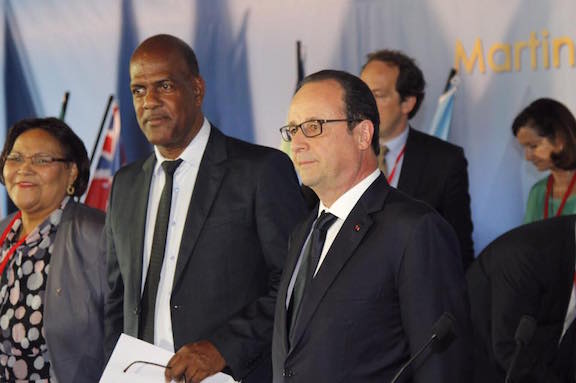Above: Serge Letchimy, president of Martinique’s Regional Council, and French President Francois Hollande in Martinique this weekend
By the Caribbean Journal staff
French President Francois Hollande headlined a major conference in Martinique this weekend addressing one of the Caribbean’s biggest challenges: climate change.
Billed as the “Caribbean Climate” summit, the conference looked to prepare and mobilize ahead of a global, UN-led climate conference, which will be held in France in late November.
It’s an existential threat to the region, which produces just around 0.3 percent of global greenhouse gas emissions, but is disproportionately affected by the growing hazards of climate change.
Martinique Regional Council President Serge Letchimy said France was “more than ever” concerned with shared development with the countries of the Caribbean.
Letchimy, who has been steadily deepening his ties with the region through what he has termed “territorial diplomacy,” called for a “new era” in the region, one marked by a new framework aimed at improved environmental management, energy biodiversity and risk prevention.
“This framework will allow us to move towards a global policy, shared, scheduled, appraised, measured, evaluated and able to build a stronger citizenship,” Letchimy said.
According to the Caribbean Community Climate Change Centre, the cost of global inaction on climate change within the sub-region could reach $10.7 billion per year by 2025, a number that could double by 2050.
The conference was attended by heads of state and top officials from across the wider CARICOM region, including Bahamas Prime Minister Perry Christie.
“For the region, climate change magnifies the growing concerns regarding food security, water scarcity, energy security and the resource requirements for protection from natural disaster,” said Bahamas Prime Minister Perry Christie. “Another significant threat is linked to the projected impact of climate change on public health, through an increase in the presence of vectors of tropical diseases, such as malaria and dengue, and the prevalence of respiratory illnesses.”
Christie said the region “is not fully able to adapt to or mitigate the loss and damages associated with climate change induced processes.”
“We most strongly advance the view that in this current situation the global architecture on Climate Change needs to be redesigned to also facilitate and promote the development of developing countries,” Christie said. “As a Region of small developing countries, regional policy makers have generally acknowledged the significant role of multilateralism.”
One area that could move the region forward in the area of adaptation could be a focus on green energy.
Christie pointed to the country’s own National Energy Policy that calls for a 30 percent green energy ratio by 2033.
The summit was hosted at the Madiana conference centre.
